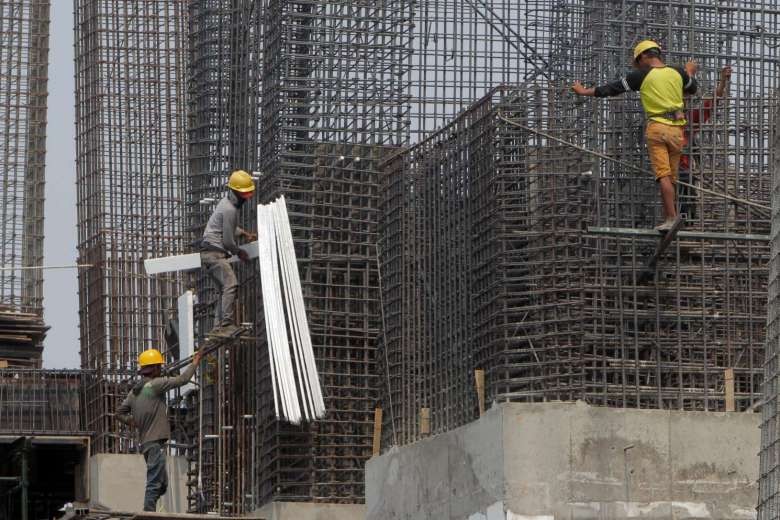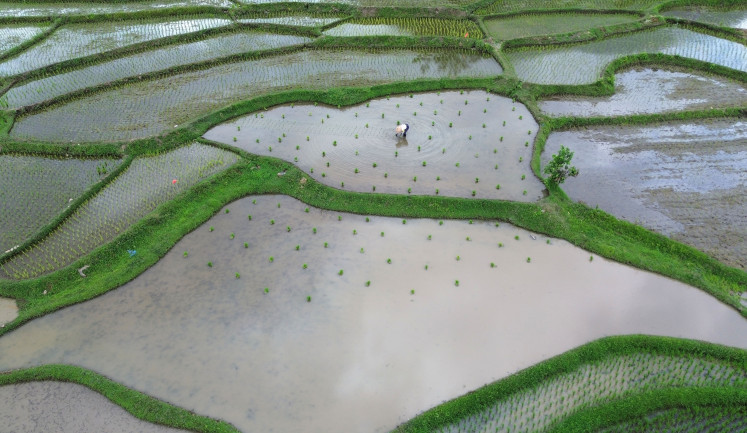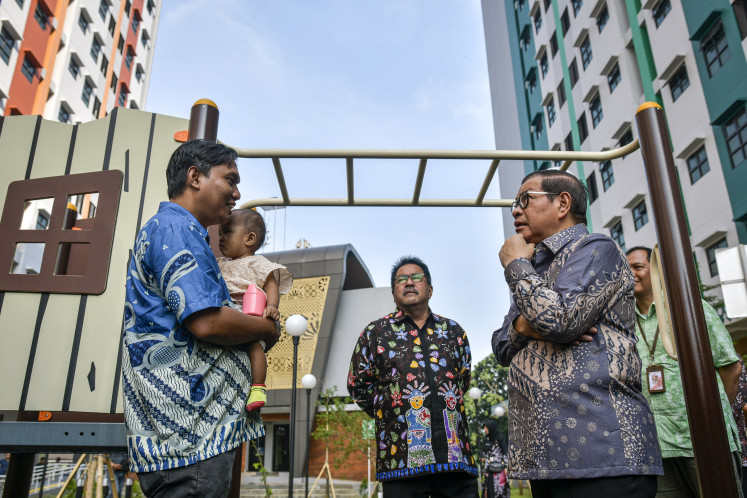Popular Reads
Top Results
Can't find what you're looking for?
View all search resultsPopular Reads
Top Results
Can't find what you're looking for?
View all search resultsIndonesia juggles globalism and nationalism
72 percent of Indonesians answered that globalization is “a force for good” in the world. However, a staggering 78 percent of Indonesians agreed with the statement “My country should be able to meet all of its own needs without needing to rely on imports from other countries”. This figure was the highest in the sample and twice the average.
Change text size
Gift Premium Articles
to Anyone
I
ndonesia has avoided the wave of hyperglobalization over the past two decades and remains relatively closed off from the world economy.
Indonesia is ranked 108th out of 140 countries in the DHL Global Connectedness Index 2016, which measures a country’s level of integration with the global economy through the flow of trade, capital, information and people. Indonesia’s rank has stayed more or less the same over the last decade and is currently far below that of its neighbors, such as Singapore (2nd) and Malaysia (19th), and of other major developing countries such as Brazil (57th), China (68th) and India (78th).
Yougov recently announced the result of a survey on people’s attitudes toward globalization across 19 countries. Surprisingly, 72 percent of Indonesians answered that globalization is “a force for good” in the world. This figure was among the highest in all the countries surveyed and aligned with the responses of more open economies in the region, such as Malaysia (73 percent) and Singapore (71 percent).
However, the survey results for Indonesians were confusing. Despite their strong support of globalization, a staggering 78 percent of Indonesians agreed with the statement “My country should be able to meet all of its own needs without needing to rely on imports from other countries”. This figure was the highest in the sample and twice the average. The third highest percentage across countries, 42 percent answered it was unacceptable for foreign investors to buy domestic companies. Just 12 percent, the lowest in the sample, agreed that immigration had a positive impact on their country.
Facing this mixed situation, the Indonesian government under President Joko “Jokowi” Widodo is juggling globalism and nationalism in economic policymaking.
On the one hand, Jokowi is greeting foreign companies with open arms, at least in rhetoric and on paper. He has been enthusiastically marketing the country’s growth potential and investment opportunities in the global business sphere and has promised to improve the regulatory environment.
The government has announced 14 economic stimulus packages since September 2015, with policies to cut red tape and to deregulate. These policies have helped Indonesia move up fifteen places from last year in the World Bank 2017 Doing Business Index.
The 10th economic stimulus package in February 2016 caught the eyes of international investors in particular. The government removed 35 sectors from the Negative Investment List, allowing 100 percent foreign ownership in these sectors. Other liberalizing measures included the government’s attempt to break the monopoly of Pertamina in oil refining and PLN in electricity distribution.
On the international stage, the government has emphasized its commitment to global integration and has shown interest in regional trade agreements. Indonesia reactivated free trade talks with Australia in March and officially launched free trade talks with the European Union in July. In November, Indonesia proposed the idea of setting up a new trade bloc between ASEAN and the Pacific Alliance at the APEC meeting.
On the other hand, Jokowi has adopted nationalistic economic policies that fall under the following three categories. First, Jokowi is emphasizing the importance of self-sufficiency. More precisely, the government wants to reduce import dependency and increase domestic production in a range of products, from beef to smartphones. This has resulted in adopting numerous non-tariff measures, such as local content requirements.
Second, Jokowi’s economic development strategy contains many characteristics of state capitalism that are found in other major emerging economies. The administration has put state-owned enterprises in charge of leading infrastructure development and reviving industrialization. It recognizes state firms as agents of development and is providing strong support for their business expansion.
Third, Jokowi is strengthening sovereignty over Indonesia’s economic resources. The administration has taken a tough stance against foreign vessels accused of illegally fishing in Indonesia’s seas. Since the end of 2014, the government has destroyed more than 220 boats, an act that other Asian countries have hesitated to take for fear of damaging their relationship with China.
The government is flexing its muscles in the energy industry and its strategy in this sector includes nationalistic economic policies from all three categories. The contract for East Ambalat’s oil and gas block, which is located on the border of Indonesia and Malaysia, has been transferred to Pertamina, Indonesia’s state energy company, after Chevron relinquished the contract due to increased tension between the two countries. Pertamina has also raised the possibility of exploring the areas close to Indonesia’s border in the South China Sea, with the support of the military. The Indonesian government has also given the operation rights of the Mahakam block, which is Indonesia’s largest source of natural gas, to Pertamina. The previous contract, which will expire at the end of 2017, was held by international energy companies that had repeatedly requested a contract extension.
Back in 2012, the United Nations recognized that a new generation of investment policies was emerging in some of the countries that were pursuing sustainable development and inclusive growth. It found that these countries were liberalizing investment regimes to attract foreign investment and regulating investment to pursue public policy objectives simultaneously. The current policy stance of the Jokowi administration reflects some aspects of this strategy.
Indonesia’s gradual, or contained, globalization may seem sensible at a time when hyperglobalization has been blamed for rising inequality and the spread of populism in advanced economies. The Yougov survey found that the West’s support of globalization was weak, with less than half of respondents in France, the United States and Britain believing that globalization is a force for good.
At the same time, the Indonesian government needs to keep in mind that the success of its development strategy depends on striking a balance between globalism and nationalism. There are benefits to taking a cautious approach when opening up borders, but Indonesia should not underestimate the benefits of globalization. The government should also bear in mind that hybridizing seemingly dichotomous sets of policies will require strong institutional and administrative capacity.
***
The writer is a PhD candidate with the Department of International Development, King’s College, London.
---------------
We are looking for information, opinions, and in-depth analysis from experts or scholars in a variety of fields. We choose articles based on facts or opinions about general news, as well as quality analysis and commentary about Indonesia or international events. Send your piece to community@jakpost.com. For more information click here.










